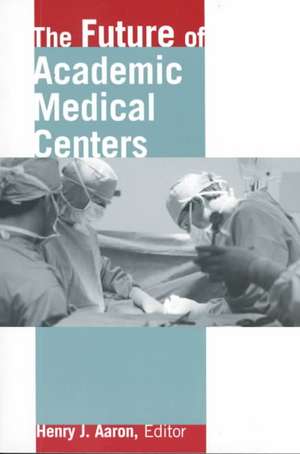The Future of Academic Medical Centers
Editat de Henry Aaronen Limba Engleză Paperback – sep 2001
Academic medical centers provide cutting edge acute care, train tomorrow's physicians, and carry out research that will expand the range of treatable and curable illnesses. But these centers themselves may need urgent care—experts generally agree that many are suffering acute—even life-threatening—financial distress. Many academic medical centers are suffering for several reasons: in-patient admissions are down, as many procedures that once required a hospital stay are now performed on an out-patient basis or in a physician's office ; managed care plans have negotiated discounted fees that cut hospital operating margins; the Balanced Budget Act of 1997 curtailed Medicare reimbursements, lowered margins and pushed some into the red; the revolution in information technology is imposing large new capital costs; and the character of medical education is receiving its most thorough review in decades. While there is a general consensus that medical centers are under pressure, experts disagree about the depth and pervasiveness of the current financial distress. Are they whining about financial pressures other, less-favored sectors find routine; or is the high quality American teaching hospital becoming an endangered species—that could face extinction if nothing is done. Because academic medical centers perform such important jobs, it is critical to determine the true nature and depth of their current financial problems—and then fashion analytically sound and politically sustainable solutions. This book brings together chief executive officers of major medical centers, university presidents, senior members of Congressional and executive office staffs, and leading analysts. These experts address the key issues and prescribe remedies both regulatory and legislative to ensure that the teaching hospital remains a picture of financial health. Contributors include Nancy Kane (Harvard School of Public Health), Jamie Reuter (Institute for Health Care Research Policy, Georgetown University), Peter van Etten (Juvenile Diabetes Foundation), Ralph Muller (University of Chicago Hospitals and Health System), James Robinson (School of Public Health, University of California, Berkeley), David Blumenthal (Institute for Health Policy, Massachusetts General Hospital), Edward Miller (Johns Hopkins University School of Medicine), Spencer Foreman (Montefiore Medical Center), Lawrence Lewin (Lewin Group), Gail Wilensky (Project HOPE), Robert Dickler (American Association of Medical Colleges), and Kenneth Shine (Institute of Medicine).
Preț: 183.84 lei
Preț vechi: 193.52 lei
-5% Nou
Puncte Express: 276
Preț estimativ în valută:
35.18€ • 36.82$ • 29.28£
35.18€ • 36.82$ • 29.28£
Carte tipărită la comandă
Livrare economică 31 martie-14 aprilie
Preluare comenzi: 021 569.72.76
Specificații
ISBN-13: 9780815702375
ISBN-10: 081570237X
Pagini: 112
Ilustrații: illustrations
Dimensiuni: 152 x 229 x 10 mm
Greutate: 0.21 kg
Ediția:New.
Editura: Brookings Institution Press
Colecția Brookings Institution Press
ISBN-10: 081570237X
Pagini: 112
Ilustrații: illustrations
Dimensiuni: 152 x 229 x 10 mm
Greutate: 0.21 kg
Ediția:New.
Editura: Brookings Institution Press
Colecția Brookings Institution Press
Notă biografică
Henry J. Aaron is a senior fellow in Economic Studies at the Brookings Institution, where he holds the Bruce and Virginia MacLaury Chair. Among his many books are Can We Say No? The Challenge of Rationing Health Care, with William B. Schwartz and Melissa Cox (Brookings, 2006), and Reforming Medicare: Options,Tradeoffs, and Opportunities, written with Jeanne Lambrew (Brookings, 2008).
Descriere
Academic medical centers provide cutting edge acute care, train tomorrow's physicians, and carry out research that will expand the range of treatable and curable illnesses. But these centers themselves may need urgent care—experts generally agree that many are suffering acute—even life-threatening—financial distress. Many academic medical centers are suffering for several reasons: in-patient admissions are down, as many procedures that once required a hospital stay are now performed on an out-patient basis or in a physician's office ; managed care plans have negotiated discounted fees that cut hospital operating margins; the Balanced Budget Act of 1997 curtailed Medicare reimbursements, lowered margins and pushed some into the red; the revolution in information technology is imposing large new capital costs; and the character of medical education is receiving its most thorough review in decades. While there is a general consensus that medical centers are under pressure, experts disagree about the depth and pervasiveness of the current financial distress. Are they whining about financial pressures other, less-favored sectors find routine; or is the high quality American teaching hospital becoming an endangered species—that could face extinction if nothing is done. Because academic medical centers perform such important jobs, it is critical to determine the true nature and depth of their current financial problems—and then fashion analytically sound and politically sustainable solutions. This book brings together chief executive officers of major medical centers, university presidents, senior members of Congressional and executive office staffs, and leading analysts. These experts address the key issues and prescribe remedies both regulatory and legislative to ensure that the teaching hospital remains a picture of financial health. Contributors include Nancy Kane (Harvard School of Public Health), Jamie Reuter (Institute for Health Care Research P












